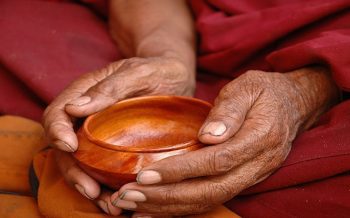By Nick Polizzi
Guest writer for Wake Up World
What do Jesus, Muhammad, and the Buddha all have in common? They each turned to a particular ancient wellness practice during the most transformative and trying periods of their lives.
If you were raised Christian, Jewish, Muslim, Buddhist, Hindu, Rastafarian, or Mormon, you’re probably familiar with the concept of fasting. But is it just a coincidence that Jesus, Muhammad, and the Buddha, who lived thousands of miles (and hundreds of years) from each other, all turned to this specific protocol in their hour of need?
Today’s piece was a real treat because of the universality of this ancient technique. I love when a healing practice has concrete value from both a medical perspective and a spiritual one.
[pro_ad_display_adzone id=”110028″]
Let’s start with the sacred and then move onto the science.
When Mahatma Gandhi was asked why he fasted, he said he had been inspired by memorable quotations of noteworthy human beings who had fasted before him.
Here are a few of those:
- A passage from Exodus regarding Moses states, “He was there with the LORD forty days and forty nights; he did neither eat bread, nor drink water. And he wrote upon the tables the words of the covenant, the ten commandments.”
- One of Muhammad’s disciples, Abu Umamah, came to him for guidance exclaiming, “Order me to do a deed that will allow me to enter Paradise.”, and Muhammad answered, “Stick to fasting, as there is no equivalent to it.”
- Perhaps one of the most notable fasters, Jesus Christ, who beat the devil in the desert while on a 40 day fast, advised “When you fast, do not put on a sad face as the hypocrites do. They neglect their appearance so that everyone will see that they are fasting. I assure you, they have already been paid in full. When you go without food, wash your face and comb your hair, so that others cannot know that you are fasting – only your Father, who is unseen, will know. And your Father, who sees what you do in private, will reward you.”
When pondering the above spiritual leaders, a few commonalities jump out at me immediately. Heart, Creativity, Endurance, and Direction.
As one of my mentors tells me, model success. And I believe fasting is a part of that.
Fasting: “the physician within.”
Aside from its positive psychological and spiritual effects, fasting has been endorsed by just about every medicine tradition (including modern medicine) for the health benefits it provides.
Hippocrates, the father of Western medicine, believed fasting enabled the body to heal itself stating, “Everyone has a doctor in him; we just have to help him in his work. The natural healing force within each one of us is the greatest force in getting well. … To eat when you are sick, is to feed your sickness.”
Paracelsus, another founder of modern medicine, wrote 500 years ago that “fasting is the greatest remedy, the physician within.”
According to Benjamin Franklin, “The best of all medicines is resting and fasting.”
Real Health Benefits
Fasting reduces the amount of input your digestive system has to break down and reassemble. The stomach, pancreas, gall bladder, liver, and intestines get to rest — a Sabbath for your insides. And rest is restorative.
Here are some handy guides to the different types of fasts, what happens to your body when you fast, and what health benefits you may experience.
Every tradition interprets the term “fasting” to mean different things. The biblical fasts that Jesus and Moses performed were extreme, “water only” fasts while a more moderate Chinese interpretation of fasting means “eating a vegetarian diet”.
Like many of my nutrition savvy friends, Chinese medicine sees cleansing the body of toxins as a function of vegetable consumption. The classics say, “Grains are for energy, meats for strength, and vegetables for keeping the body clean.”
If you would like to try a fast for more than 24-48 hours, I would personally recommend starting with a fast like the one below.
Here’s a very common week-long fast in Buddhist practice:
For 7 Days, eat the bulk of your protein (whether vegetable based or other) in the morning and afternoon. For dinner, prepare a plant based meal using greens like kale, dandelion, spinach, collard greens; some cruciferous vegetables like broccoli, cauliflower, cabbage; and a starchy veggie like acorn squash or sweet potato.
Fun fact: Buddhists have been known to fast on water only for up to 72 days!
When I was a youngster, my father gave me a nugget of wisdom that has always stuck with me – “In many realms of life, less is more.”
Until next time,
Nick Polizzi
Recommended articles by Nick Polizzi:
- The Art of Smudging: A Shamanic Cleansing Ritual
- Sacred Science: A Jungle Healing Technique You Can Use Anywhere
- Wired for Tribe
- 3 Wild Herbs for Lucid Dreaming
- Eye Gazing — An Exercise for Soul Vision
- A Sunrise Prayer to Start Your Day
- A Native Smoke Ritual For Renewal and Clarity
- 3 Ancient Medicines That Already Live In Your Home
- A Breathing Exercise to Take You Higher
- A Healing Soup Recipe to Warm Your Soul
About the author:
 Nick Polizzi has spent his career directing and editing feature length documentaries about natural alternatives to conventional medicine. Nick’s current role as director of “The Sacred Science” documentary and author of “The Sacred Science: An Ancient Healing Path For The Modern World” stems from a calling to honor, preserve, and protect the ancient knowledge and rituals of the indigenous peoples of the world.
Nick Polizzi has spent his career directing and editing feature length documentaries about natural alternatives to conventional medicine. Nick’s current role as director of “The Sacred Science” documentary and author of “The Sacred Science: An Ancient Healing Path For The Modern World” stems from a calling to honor, preserve, and protect the ancient knowledge and rituals of the indigenous peoples of the world.
For more, visit www.thesacredscience.com (where this article first appeared.)
[pro_ad_display_adzone id=”110027″]







